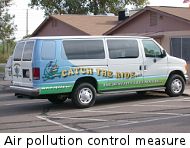Arizona: Federal Judge Overrules Legislature on Transit Subsidies
Arizona must subsidize those who ride on buses, vans and light rail, regardless of the desire of state lawmakers or voters to do otherwise. US District Court Judge David G. Campbell on Friday overturned a state law enacted in March last year to curtail excessive spending by slashing such subsidies. The legislature canceled the Local Transportation Assistance Fund, which had doled out $127 million in taxpayer cash since 1998 to various mass transit programs using funds from the Powerball lottery.
For example, Arizona funnels public money into privately run van service companies, counties, municipalities and Indian tribes under the federally authorized Section 5310 mass transit program. The grants provide capital funds for the purchase of vehicles that are used mostly to provide subsidized transport for people over the age of sixty. The University of Arizona received one of these grants through Pima County to buy three golf carts in 2008. Bullhead City offers complimentary paratransit service with 15 percent of its senior citizen passengers boarding at the Laughlin Casino Resort.
“Defendants assert that this lawsuit has no significance to air quality or transit services in the Phoenix area,” Judge Campbell wrote. “But the advisability of requiring lottery funding for transit, or other policy considerations that went into the SIP, are not for this court to decide.”
Campbell’s order effectively nullified House Bill 2012, which had repealed the Local Transportation Assistance Fund. He also ordered the state to provide up to $18 million in funding each year to such programs.
“This circuit has made clear that provisions of an EPA-approved SIP are federally enforceable in district court through the CAA’s citizen suit provision,” Campbell ruled. “Absent prior approval from the EPA, the Arizona legislature lacked authority to repeal the portions of A.R.S. Section 5-522(A) that are included in the SIP, and that the legislature’s attempt to do so therefore is null and void and the lottery funding requirement included in the SIP remains in full force and effect.”
A copy of the ruling is available in a 90k PDF file at the source link below. Pictured: a van purchased by the Apache Junction Parks and Recreation department using LTAF funding.
Source:
Paisley v. Darwin (US District Court, Arizona, 9/2/2011)
[Courtesy: Thenewspaper.com]
More by The Newspaper
Latest Car Reviews
Read moreLatest Product Reviews
Read moreRecent Comments
- Master Baiter Mass adoption of EVs will require:[list=1][*]400 miles of legitimate range at 80 MPH at 100°F with the AC on, or at -10°F with the cabin heated to 72°F. [/*][*]Wide availability of 500+ kW fast chargers that are working and available even on busy holidays, along interstates where people drive on road trips. [/*][*]Wide availability of level 2 chargers at apartments and on-street in urban settings where people park on the street. [/*][*]Comparable purchase price to ICE vehicle. [/*][/list=1]
- Master Baiter Another bro-dozer soon to be terrorizing suburban streets near you...
- Wolfwagen NO. Im not looking to own an EV until:1. Charge times from 25% - 100% are equal to what it takes to fill up an ICE vehicle and 2. until the USA proves we have enough power supply so as not to risk the entire grid going down when millions of people come home from work and plug their vehicles in the middle of a heat wave with feel-like temps over 100.
- Kwik_Shift_Pro4X Where's the mpg?
- Grg These days, it is not only EVs that could be more affordable. All cars are becoming less affordable.When you look at the complexity of ICE cars vs EVs, you cannot help. but wonder if affordability will flip to EVs?


































Comments
Join the conversation
So much for the USA being a Democracy. It's become a judgocracy.
Oh how I loathe those activist judges that don't do what I want them to do! Actually I am being redundant here because they are not activist judges if they do what I want them to do. The EPA was created by Congress and given, by Congress, a set of rules under which it must operate under. The EPA, like all administrative agencies of the United States, has the full authority of Congress under those rules because Congress delegated its authority to the administrative agency. This is a well-established part of the United States government, has been upheld on many occasions by various Supreme Courts that have leaned both left and right, and it has been this way for more than 100 years. If you don't like the rules, you get Congress to change them. You don't create a new law at the state level like Arizona did, because the courts will throw it away. The right solution but the wrong approach. Case closed.